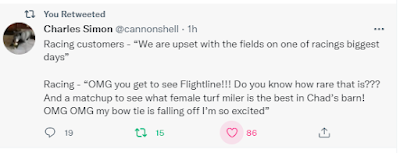What are things that are paramount in 2022 with regards to equine athletes?
Horse deaths, wastage, sending out horses to race that probably should not have be sent out to race, to name but three.
For much of human history - any epoch really - humans were incredible killing machines. When we hunted and gathered we killed indiscriminately. When we settled Australia 70,000 years ago we wiped out dozens of species. When we moved to North America thousands of years ago, we killed everything in our paths.
Even as recent as one hundred years ago during the exploration of the Arctic - when we began to be more sensible in countless matters, and were starting to be educated en masse - we still killed virtually every animal in front of us. Killing an animal was a feature of humanity, not a bug.
In the last forty or fifty years - a tiny, tiny slice of humanity - remarkably, this feature has been completely flipped on its lid. An ingrained part of our DNA and culture is now found by most to be taboo. We can't imagine ever doing what "they" did, and we might rename a school or street for those who did; even though we probably would've done the same thing, because that's all we'd have ever known.
Just this month a report on horse deaths at Santa Anita was released and the news was good. The reforms, hoped for by some, joked about by some others, seems to have worked pretty well. The pressure is off, it appears, until perhaps a next crisis. But kudos to California racing for stepping up to the plate. They said they were going to do something, and they did it.
HISA is another brick in this new wall - the wall that modernizes human's use of animals because we aren't killing machines anymore. Like any new policy (check laws in congress or the House of Commons for reference) it can get blown off course, or bastardized. We talk more about HISA and lasix than keeping the eye on the prize, which is, of course, protecting the safety of the horses.
But this organization - like it or not - is very important.
The sport has to be honest with itself, and lead with conviction. Horse safety, wastage, doing better by being better stewards of the horses is not something we can address with lip service, or do it only when someone is looking. It's reality. The importance of being earnest is now the feature, not the bug.
Have a nice Tuesday everyone.



